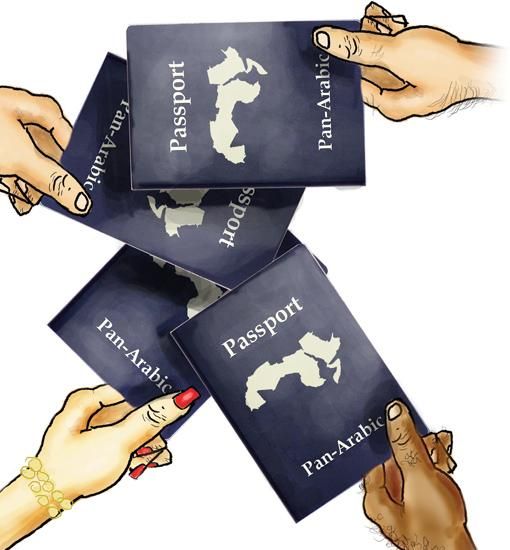An Arab is a person who belongs to the Arab culture or has Arab cultural origins. The Arab identity is not linked to an ethnicity, religion, political stand or ideology, and does not depend on political circumstances and changes.
Adhering to pan-Arabism means belonging to one nation with common language and culture, and a shared history on a shared land. This nation also shares same interests and destiny, which may take the shape of a federation or integration between its entities (countries) in the future.
The Arab cultural identity as a language and culture existed before Islam, but it was confined to Arab tribes that shared certain geographic boundaries.
Before Islam, pan-Arabism meant Arabic language and culture, but it began to become a civilisation and cultural identity and allegiance with the start of Islam and its connection with the Arabic language, the language of the Quran, and the spread of Islam by Arab pioneers.
Islam and the Quran contributed significantly to transforming pan-Arabism from the cultural identity of an Arab race into the wider horizons of cultural identity and common civilisation that include all Arab and non-Arab Muslims.
Through this, the Arab culture has become a comprehensive cultural identity for all non-Muslim Arabs and non-Arab Muslims.
The weakness of the common Arab culture leads to the domination of sectarian and ethnic names over the Arab societies, which will eventually lead to domestic crisis and tension in each Arab country.
Therefore, Arabism here becomes not a mere solution to the crisis of inter-Arab relations but also cultural and social fort that safeguards and protects national entities within each Arab country.
Maybe one of the most important topics that needs to be revised is the weakness of the national identity and the domination of sectionalism, which is a phenomenon that prevails in many Arab countries. This makes the domestic, constitutional and political structure fragile.
Also, the sectionalist allegiance will become a means to preserve political or personal gains or to seize them from others in power.
Another important point is that the weakness of the national identity will pave the way for foreign interference and foreign occupation in some cases. This happens when the priority is given to tight affiliations that are used as pretexts to deal with any foreign party.
The poor common national identity is an expression of misunderstanding of other affiliations. Belief in different religious sects or being proud of ethnic and tribal origins is a natural and healthy phenomenon in multi-ethnic and religious communities.
Yet, the problem is when this difference is transformed into violent struggle and bloody political conflicts that contradict pluralism and then make one hold others accountable for what they were born to be, not for their deeds and ideas. And this is in contradiction of all divine and earthly teachings.
Who is a cultured individual?
Being cultured is an individual status, and does not describe a group with shared targets or action.
A cultured person is not necessarily a researcher, writer or even an educated person, he or she does not always assume opposition or nationalist positions.
Yet, a cultured individual who is committed to his nation's causes combines his personal concerns with the issues of people around him. He combines education and professionalism with awareness and knowledge of social problems.
The question that arises here is: What is the role of cultured Arabs?
Before talking about the role of cultured Arabs, there must be cultured Arabs who have common ideological concepts about allegiance and identity, and common ways to describe ground realities and causes of problems.
They should also seek a joint vision for a better Arab future before giving an answer to the question about the cultured Arab's role.
There are three main pillars for change, which must be defined first. These are ideological foundations, method and objective. No target can be achieved without these three basic pillars.
This simply means that a national objective cannot be achieved through sectarian or sectional foundations or methods.
Therefore, identifying ideological foundations, method and objective is the proper way to a more positive and effective role for the cultured Arabs who are committed to their nation's issues.
Regretfully, the Arab status and most ideological theories, as well as practices, do not strike a balance between the three slogans: Democracy, liberation and Arab identity.
Some Arabs call for liberation and resisting occupation from a sectional ideological perspective or from an anti-Arab identity stand.
Meanwhile, some others still adhere to their Arab identity and liberation slogans, but within the framework of regimes or organisations that oppose democracy.
Some suppress others' opinion and fight ideological and political diversity, which are the cornerstones of any healthy democratic community.
There is a major imbalance in the Arab region when it comes to dealing with the slogans of democracy, liberation and Arab identity. This is a direct Arab responsibility, and not necessarily caused by foreign interference or American domination.
Now, Arab countries have an urgent need to build a liberal democratic Arab movement, based on a balance of ideology and practice between democracy, national liberation and Arab identity.
This intellectual, cultural and political movement must bring all Arabs together within the same nation. If the proper mechanism is available, it would be very easy to implement the slogans.
Sobhi Ghandour is head of Al Hewar Centre, Washington, USA.
Your comments
I'm egyptian and seeing this picture on top of the article made me day dream about the day when all of us arabs will unite and make something like the european union
Mahmoud
Dubai,UAE
Posted: July 10, 2009, 15:19












